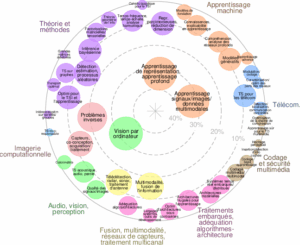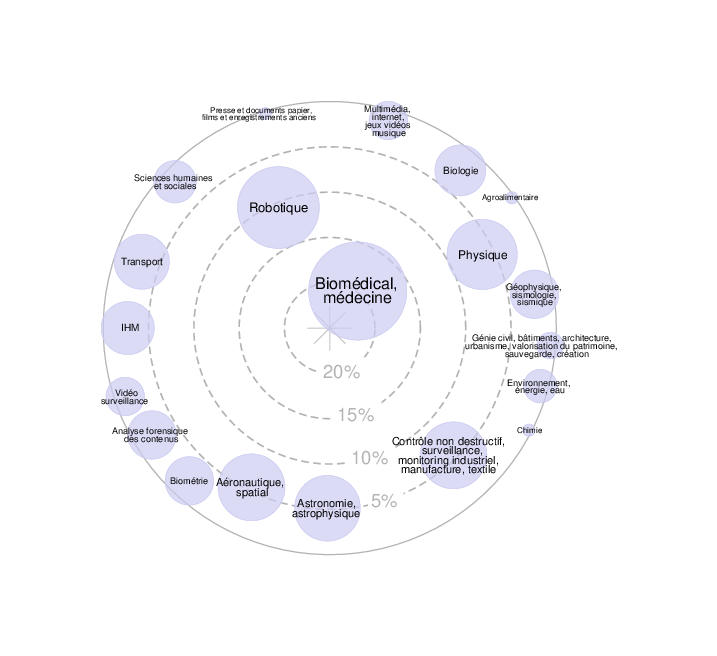Stage M2/Ingénieur (+thèse)
Location: IMT Atlantique and LaTIM (Laboratory of Medical Information Processing), Brest, France
Keywords: Medical imaging, Computer vision, Segmentation, Biomechanics
As part of the PeRSAPlan project (“Personalised Reverse Shoulder Arthroplasty Planning” funded by the French research Agency), we are recruiting a Master 2 or final-year engineering student for a 6-month internship in academic research, with a PhD opportunity afterwards.
CONTEXT
Reverse total shoulder arthroplasty (RTSA) is a treatment of choice for shoulder osteoarthritis, complex proximal humeral fractures, or rotator cuff tears. While its usage significantly increased over the last decades, RTSA is still prone to complications (> 20%) such as instability or fractures. PeRSAPlan project aims to fully rethink RTSA planning in order to personalise the intervention and further reduce the risks of complications, by better considering both patient-specific mechanical and functional parameters.
The patient’s bone shape, density and mechanical properties can be determined from a CT scan, offering insightful information to optimize the placement and fixation of the prosthesis. However, current methods to determine these properties are time-consuming, technically challenging, and therefore not easy to use in clinical routine.
PeRSAPlan’s objective is to provide surgeons with an easy-to-use and reliable decision-making assistant to determine the optimal prosthesis implantation adapted to the patient-specific shoulder morphological, mechanical, and functional properties. PeRSAPlan aims to enhance RTSA clinical outcomes and offer a better quality of life post-operatively. To do so, statistical and biomechanical 3D modelling of the scapula (shoulder blade) will be carried out, capable of representing the diversity of shape and bone quality in patients. This modelling will serve as a basis for developing an automatic tool predicting the biomechanical properties of the scapula, reliably and rapidly, based on the morphological and material characteristics of the bone. Together, the modelling of the anatomy and the prediction of the biomechanics of the shoulder will assist surgeons in personalising the surgical planning of RTSA.
INTERNSHIP ACTIVITIES
To determine the biomechanical properties of the scapula, you will establish an overview of methods for segmenting and modelling bones, and will identify a relevant solution for segmenting and modelling automatically the scapula in 3D, in terms of shape and bone mineral density (BMD).
A neural network-based approach (U-net) has already been developed at LaTIM for bone shape segmentation and could be used as initial solution. BMD will be assessed quantitatively using the pixel intensities of the CTscan images. A statistical shape and density model of the scapula will be developed, representing the variations in bone shape and BMD. An analysis of the main muscular stresses will be carried out to conduct initial finite element analyses evaluating bone quality, according to variations in shape and BMD. This study will then be used to determine, for example, the risk of acromion fracture following the action of the deltoid muscle, depending on the patient’s bone and the configuration of the prosthesis.
* Summary of the state of the art in automatic segmentation methods for the scapula
* Creation of an annotated database.
* Implementation and validation of the selected segmentation methods.
* Development of a statistical shape and density model of the scapula
* Review of the muscular stresses to conduct finite element analyses
PROFILE
Master 2 or final year of engineering in Biomedical Engineering / Biomechanics / Computer Vision / Digital health or other related domain
* 3D Visualisation / Statistical Modelling
* Segmentation / Deep learning / Neural networks
* Biomechanics / Finite element analysis
* Python/C++ programming
* Good French and English skills (for communication, reading/writing/summarising articles)
* Interest in multidisciplinarity, academic research, and innovation in healthcare
ENVIRONMENT
The internship will take place at the Data science department at IMT Atlantique (Technopole, Plouzané, France) with regular exchanges with the Imagine team at LaTIM located at CHU Morvan (city centre, Brest, France) and contacts with the OT&B Lab (Victoria, BC, Canada).
As a leading general engineering school of the Institut Mines-Télécom, IMT Atlantique aims to support transitions, train responsible engineers and put scientific and technical excellence at the service of teaching, research, and innovation. The Data Science Department (DSD) develops research and teaching activities in the interdisciplinary field of data science, with the scientific objectives to give meaning to data in order to create information, to understand and model this information in order to produce knowledge, and to support and inform human decision-making.
The LaTIM (Laboratory of Medical Information Processing, INSERM UMR 1101) was created as a result of the complementary nature of the fields of ICST and health, and is developing multidisciplinary research led by members from the University of Western Brittany, IMT Atlantique, INSERM and the University Hospital of Brest. Within the LaTIM, the Imagine team conducts research to continuously optimise therapeutic actions through the integration of multimodal information, for neuro-musculo-skeletal diseases.
ADDITIONAL INFORMATION
Start date: March 3, 2025
Duration: 6 months (indemnities)
Location: IMT Atlantique, Technopôle Brest-Iroise, 29238 Brest, France
Supervision: Aziliz GUEZOU-PHILIPPE, assistant professor at IMT Atlantique (Data science department) and at LaTIM (team Imagine)
PhD opportunity within PeRSAPlan following the internship, in collaboration with the OT&B Lab at the university of Victoria (BC, Canada). Topics: Biomechanics, Finite elements analysis, Morphometrics, Statistical shape modelling, Prediction, Machine learning, Range of motion, Clinical measurement, Planning software
APPLICATION
Send resume, cover letter, academic transcripts and rankings to
aziliz [dot] guezou-philippe [at] imt-atlantique [dot] fr





